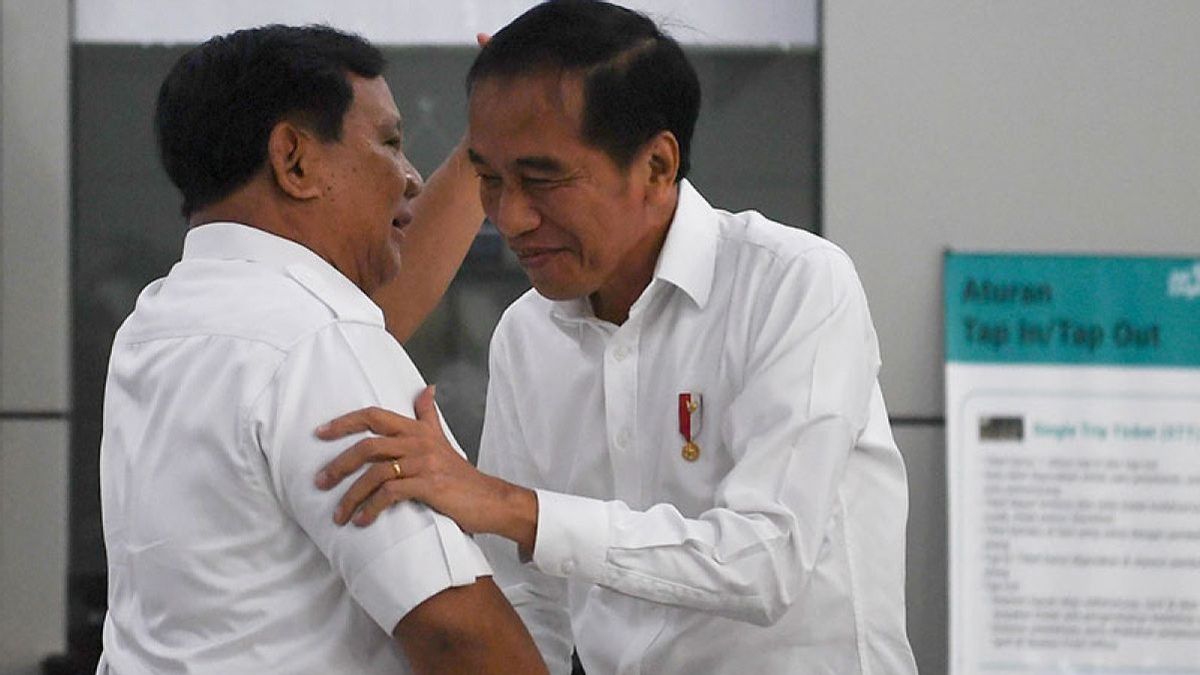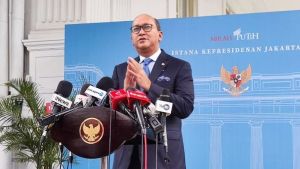JAKARTA - The government of the President and Vice President Elected Prabowo Subianto-Gibran Rakabuming Raka must be prepared to pay due debt that swells before the end of President Joko Widodo's (Jokowi) administration.
Based on data from the Ministry of Finance (Kemenkeu), the total interest budget in the 2024 State Budget is IDR 497.31 trillion and has been paid in the first semester of 2024 worth IDR 239.96 trillion. So that the interest on debt that must be paid by the government in the second semester of 2024 is IDR 257.353 trillion.
Meanwhile, the position of government debt as of the end of May 2024 reached IDR 8,353.02 trillion, an increase to the level of 38.71 percent of gross domestic product (GDP). The position of government debt in May 2024 increased by IDR 14.59 trillion, an increase of around 0.17 percent when compared to April 2024 which was valued at IDR 8,338.43 trillion or with a ratio of 38.64 percent to GDP.
To note, this value is still below the safe limit of 60 percent of GDP according to Law Number 17/2003 concerning State Finance and is still below the limit set through the Medium-Term Debt Management Strategy for 2024-2027 at the level of 40 percent.
Meanwhile, based on the instrument, the composition of government debt is dominated by Government Securities (SBN) instruments whose contributions are 87.96 percent. Until the end of May 2024, the issuance of SBN was recorded at IDR 7,347.50 trillion. This issuance is divided into domestic SBN, which is 70.69 percent and SBN foreign currency (foreign currency) is 17.27 percent.
In the KITA State Budget report, Domestic SBN amounted to Rp5,904.64 trillion which was divided into Government Securities (SUN) amounting to Rp4,705.24 trillion and State Sharia Securities (SBSN) worth Rp1,199.40 trillion. Meanwhile, SBN Valas amounted to Rp1,442.85 trillion, with details, SUN amounted to Rp1,086.55 trillion and SBSN worth Rp356.30 trillion.
In addition, the government debt contributed 12.04 percent of the government loan debt until the end of May 2024 which amounted to Rp1,005.52 trillion with details of domestic loans of Rp36.42 trillion and foreign loans of Rp969.10 trillion.
As for foreign loans, the details are bilateral loans of Rp265.83 trillion, multilateral loans of Rp584.65 trillion, and commercial bank loans of Rp118.62 trillion.
Meanwhile, debt due as of April 30, 2024 for the period 2025 to 2029 reached IDR 3,748 trillion. As for the details in 2025 of IDR 800.33 trillion, in 2026 it was IDR 803.19 trillion, while in 2027 it was IDR 802.61, in 2028 it was IDR 719.81 trillion and in 2029 it was IDR 622.3 trillion.
Director of the Digital Center of Economic and Law Studies (Celios) Nailul Huda assessed that the ratio of government debt that rose to GDP left a bad impression ahead of the end of President Joko Widodo's (Jokowi) administration.
"Jokowi has left a bad legacy in debt management even though the percentage of GDP is still safe according to the law (under 60 percent)," he told VOI some time ago.
According to Huda, government debt has increased significantly every year, plus when handling the COVID-19 pandemic which requires a fairly large budget.
"However, the nominal figure continues to increase drastically. In 2020-2022 our debt will increase sharply to finance the handling of COVID-19," he said.
According to Huda, the government's debt matures in 2025, making it predicted that the fiscal deficit will increase sharply next year.
"Unfortunately, the primary balance (acceptance of non-debt government expenditures) is also targeted to be negative. This means that to pay off our debts we must also owe," he said.
Huda said that even though in the last few years it has been positive, it is very unfortunate that the government is targeting a negative primary balance.
"As a result of the payment of debt will accumulate, the Prabowo government will find it increasingly difficult to control debt in the future," he said.
Similarly, Bank Mandiri Economist Reny Eka Putri said that significant government debt growth could be a burden for the State Revenue and Expenditure Budget (APBN).
According to Eka, oversized debt can lead to high interest payments, reducing space for allocation of funds in important sectors such as infrastructure, education, and health.
"In addition, large debt also poses a risk of increasing the country's economic and financial instability, especially if the government faces difficulties in paying the debt," he explained to VOI some time ago.
However, Reny reminded the importance that government debt can also have a positive impact if managed properly. The debt can be used to fund urgent development projects, which are expected to make a positive contribution to economic growth.
In addition, Reny said that there are several factors that need to be considered to evaluate the extent to which government debt will burden the state budget.
"We are quite optimistic that the Government has the ability to manage debt and ensure effective and efficient use of debt funds," he said.
Reny explained that the use of funds for profitable development and investment projects can help reduce debt burdens, while increasing the potential for state revenue.
In addition, the government also needs to implement a sustainable fiscal policy, by controlling state spending and increasing revenues, including through tax reforms.
Reny conveyed that through a disciplined fiscal policy, the government can help manage debt better and maintain the stability of the state budget.
Thus, Reny explained that although the condition of high government debt can be a burden for the state budget, with good management and strong economic growth, the negative impact of the debt can be minimized.
"In this context, the government needs to take appropriate action to manage debt wisely and maintain the country's fiscal stability," he added.
This year, Reny said that the APBN deficit would still be maintained below 3 percent of GDP if state revenues and expenses were realized according to the APBN.
Two Options That The Government Can Do To Pay Debt Dues Due To Tempo
Head of Bank Permata economist, Josua Pardede, said that related to debts that are due in general, the government has 2 options for making payments.
According to Josua, the first way is that the government can carry out a debt switch, namely the repurchase of Government Securities whose transaction settlements are carried out by handing over other series of Government Securities.
Meanwhile, if there is a difference in the value of the settlement of the transaction, the government can make a cash payment of the State Debt.
"The second alternative considers maturing debt, especially in the context of handling the pandemic, will reach its peak in 2026," he explained to VOI some time ago.
VOIR éGALEMENT:
According to Josua, the government also needs to consider government spending which is on a low priority scale to delay financing so that it will be able to support the maintenance of fiscal deficits at a healthy level which also has an impact on the cost of borrowing of competitive governments.
Josua Pardede estimates the position of foreign exchange reserves will be 140 billion US dollars to 142 billion US dollars by the end of 2024 or a decrease compared to the end of 2023 which amounted to 146.4 billion US dollars.
Even so, Josua said that this year's foreign exchange reserves will still have the opportunity to fall, due to the risk of a higher policy interest rate for the longer.
"We are still anticipating the risk of higher policy interest rates for the longer and, as a result, we see the potential decline in foreign exchange reserves in 2024," he explained.
Josua said that risks related to global uncertainty will remain a major concern during the first semester of 2024, especially related to risk-off sentiment amid a higher for-longer policy interest rate.
According to Josua, this can limit the flow of foreign funds into Indonesia to a certain extent. In addition, the decline in the trade surplus due to the normalization of commodity prices and the weakening of global demand, coupled with Indonesia's strong domestic demand, will pose a risk of widening the current account deficit.
In addition, Josua explained that seasonal factors such as coupon payments and dividends to non-residents, which usually peak in the second quarter, also contribute to widening the current account deficit.
The English, Chinese, Japanese, Arabic, and French versions are automatically generated by the AI. So there may still be inaccuracies in translating, please always see Indonesian as our main language. (system supported by DigitalSiber.id)
















